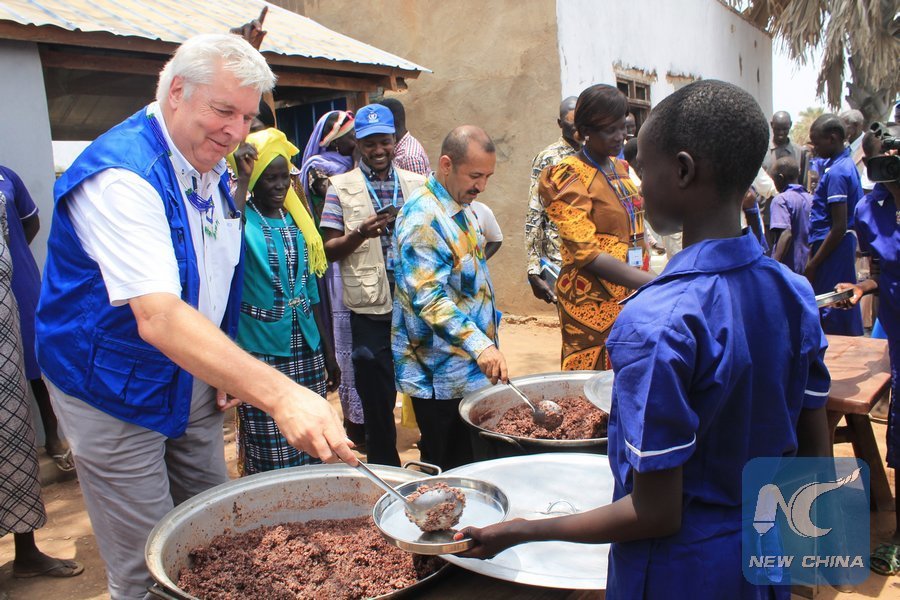
Simon Cammelbeeck (L), World Food Program (WFP) Deputy Country Director in South Sudan serves boiled wholegrain sorghum to a student during the launch of a school feeding program in in Aweil town, South Sudan, March 28, 2019. (Xinhua/Gale Julius)
JUBA, April 2 (Xinhua) -- The World Food Programme said on Monday the prevailing peace coupled with low hindrance incidences have enabled it to preposition about 175,000 tons of food ahead of the rainy season to reach millions of South Sudanese in need.
Ronald Sibanda, WFP country representative told Xinhua that peace has helped them to preposition food countrywide to reach 5.2 million food insecure people in South Sudan.
"The good news is that in most parts of the country there is access because of peace, we have reduced significantly the air drops. We are using river transport from the Nile and its tributaries, and we are using road trucks to deliver food assistance. This reduces tremendously the cost allowing us to save a lot of money that can be used to buy food," Sibanda said in Juba.
"We are prepositioning food up country, the intention is to preposition as much as 175,000 tons of food before the rains begin, thanks very much to our donors who have given us money in advance to be able to get the food and move it upcountry," he added.
A report released in February reveals that the number of food insecure people in South Sudan grew from 6.1 million in 2018 to 6.8 million in January.
The report warned that out of the nearly 7 million food insecure people, 30,000 people are staring at famine in Jonglei and Lakes states, in the eastern and central parts of the world's youngest republic.
"There are many locations within the country that require (food) assistance. That's why we are struggling to reach all the states. The challenge for us is whether we continue to use the cheaper means of transport to reach those people," added Sibanda.
WFP previously relied on air drops and speed boats to deliver food to far flung areas in north western region of Upper Nile.
Sibanda disclosed that they are working with the government to ensure unhindered access throughout the country.
"We are working with the government. On the main high way to Rumbek from Juba we have seen a very much reduction in illegal (road) fees which were there before. We think this is every good sign that should be applied in every part of the country where we are going," he said.
He said that they are putting up storage units to receive the food in case the roads are cut off during the upcoming rainy season.
"We are happy that the partnership we have with the communities, the incidences we had in the past of looting will not happen because the communities have given us assurances that they will be managing the food helping us to look after the food," he noted.
"So we are prepositioning the food before the rains to make sure that we can maintain the response at the current level," said Sibanda.

